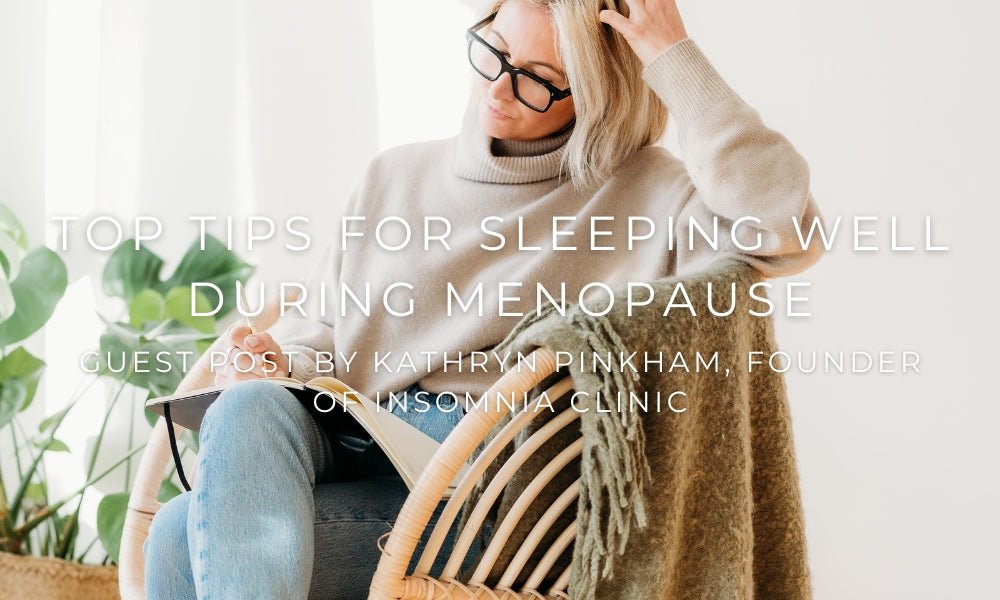At Pretty You London, we’re passionate about supporting women through all stages of life—and that includes menopause. We know how challenging it can be to get a good night's sleep during this time of change, which is why we’re thrilled to have Kathryn Pinkham, founder of The Insomnia Clinic, as a guest on our blog today, World Menopause Day.
Kathryn is an expert in helping people manage and overcome sleep issues, and she’s here to share her top tips for sleeping well during menopause. From establishing a consistent sleep schedule to reducing the pressure to "sleep perfectly," and making important lifestyle changes that promote rest, Kathryn will guide you through practical steps to improve your sleep during this transitional phase.
Let’s hear from Kathryn as she shares her expert advice...
Menopause can signal a whole host of changes in a woman’s life, and sleep disturbances are often one of the most common challenges. In fact, over 67% of women report sleep disturbances during this period. Many experience insomnia, night sweats, and anxiety, which can significantly impact both their overall well-being and long-term health.
4 Tips for Sleeping Well
Cognitive Behavioural Therapy for Insomnia (CBT-I) is a structured programme that helps individuals identify and change the thoughts and behaviours that contribute to sleep problems.
1. Sleep Scheduling: While it’s often advised to go to bed at the same time each night, if that schedule leads to hours of tossing and turning, it might not be right for you. Instead, focus on quality, not just quantity. The quickest way to enhance sleep quality is to spend less time in bed. By going to bed a bit later and setting your alarm a little earlier, you can help consolidate sleep, reduce the time you’re awake in bed, and encourage your body to feel more tired at bedtime.
2. Reduce Pressure on Sleep: Many women feel anxious about their inability to sleep, creating a cycle of worry that only makes things worse. Start by noticing your thoughts and feelings about sleep. Consider writing them down: how does your body react when you worry about sleep? What’s your worst fear? Acknowledging these thoughts can help you process them during the day instead of at 3 a.m. Instead of thinking, “If I don’t get sleep, I won’t cope tomorrow,” remind yourself of times when you didn’t sleep well but still managed to get through the day. Be kind to yourself—this is a challenging time, and adding more pressure will only make it harder to rest.
3. Connect Your Bed with Sleeping: If you wake up with a hot flush and find your heart racing, it’s tough to drift back to sleep. Staying in bed while feeling stressed will connect negative emotions to your bed meaning that your bedroom could become a cue for anxiety and other negative emotions. If this happens, leave the room. Go to another space, watch TV, or read a book until you feel sleepy again then return to bed. This will help preserve the positive association with your bed and give you time to calm your mind and body.
4. Notice Your Lifestyle: When we’re tired, it’s easy to fixate solely on sleep in hopes of boosting energy. But this pressure can actually worsen sleep quality. During menopause, it’s normal for sleep to suffer, so try to focus on other ways to feel rested. Assess your diet—when tired, we often crave sweets, but stocking your fridge with healthy foods can make a difference. Stay hydrated by keeping a water bottle nearby. Try to exercise daily as this will boost energy levels- even a short walk when you feel most tired. Also, consider your stress levels; anxiety and a busy schedule can drain your energy. We can’t out-sleep stress, so find ways to relax. Practicing mindfulness throughout the day can help ground you and give your mind the break it needs.

Kathryn Pinkham is the founder of The Insomnia Clinic and a leading expert in sleep therapy. With years of experience helping individuals improve their sleep quality, Kathryn specialises in Cognitive Behavioural Therapy for Insomnia (CBT-I) and is passionate about guiding women through the unique challenges of menopause. To learn more about her work and to join the Sleep Well & Live Better Course during Menopause visit www.theinsomniaclinic.co.uk
Read more

Looking for the perfect blend of comfort and effortless style? Our new Velour Lounge Set delivers just that, combining luxury and practicality in one chic package. Crafted from premium ribbed velo...

As the cooler months settle in, there's nothing quite like slipping into the warmth and comfort of plaid nightwear. This timeless pattern has made its mark in fashion for years, and it's easy to s...



Leave a comment
All comments are moderated before being published.
This site is protected by hCaptcha and the hCaptcha Privacy Policy and Terms of Service apply.